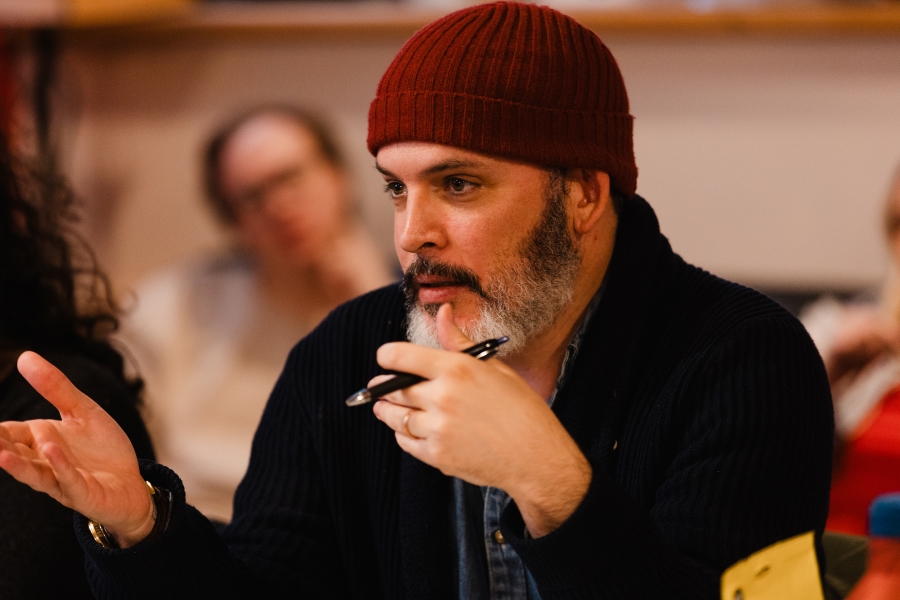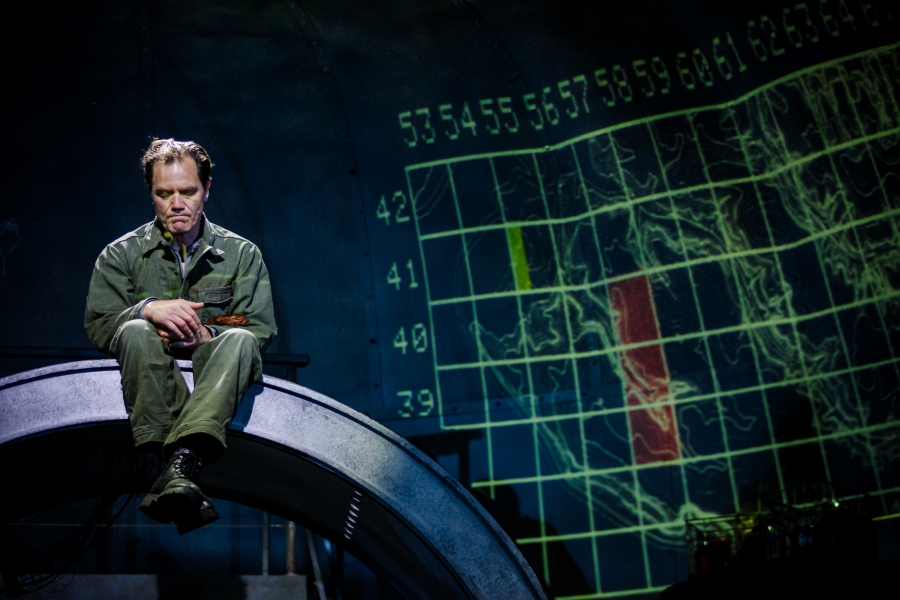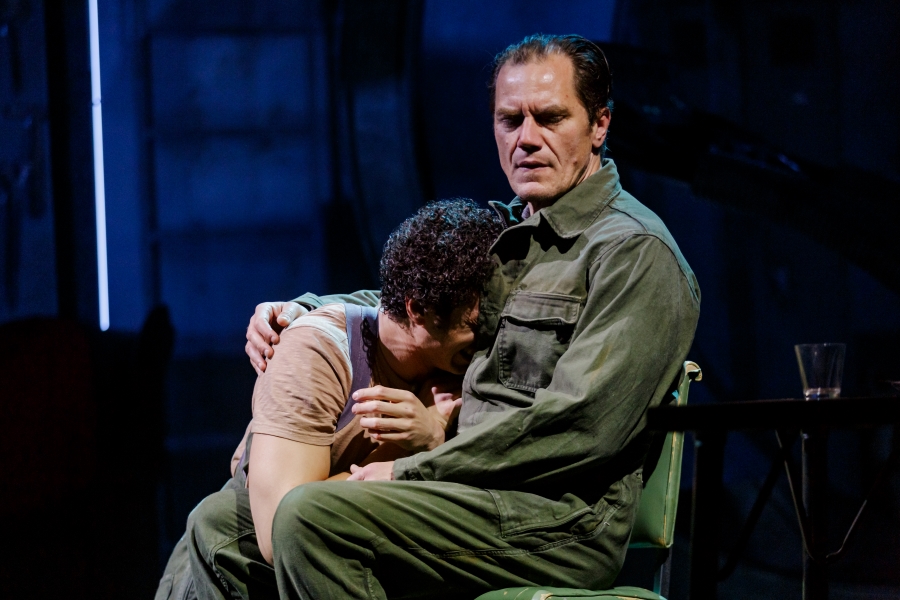“I don’t think it’s a horror play. It’s much stranger than that.”
It’s hard to tease playwright Levi Holloway’s new play Turret (in a sold-out run through June 22) any better than those words from the man himself. Starring A Red Orchid Theatre ensemble members Michael Shannon and Travis A. Knight, Holloway’s play—which he called “a spiritual cousin” to the horror and thriller genres—welcomes audiences into an underground bunker for an eerie journey, something akin to a mix of M. Night Shyamalan’s The Village with Groundhog Day. It’s a work that draws on Holloway’s own experiences dating back to the beginning of the pandemic lockdown in 2020.
“I was feeling pretty claustrophobic, and every day kind of felt like a loop,” said Holloway, who also directs this production.
Somewhere in the Pacific Northwest, Green and Rabbit (Shannon and Knight, respectively) are surviving in an underground bunker, hidden away from a mysterious enemy looming just outside their vault door. Days are almost rote, with Rabbit running on a treadmill while Green issues a strange series of cognitive tests: from confirming basic information, like their mission, to trials of precognition and challenges to Rabbit to predict the details of a photo before it’s shown to him. Day in, day out, the same. From there, what starts as a militaristic relationship turns fatherly, and then into something else entirely, as the play progresses and a visitor upends everything.

It is in that first turn, from parental to otherwise, that Turret morphs from the all too familiar feeling of repetition, of being stuck inside during the lockdown days of the pandemic, into something much more personal. In addition to wanting to create a play for Knight and Shannon—whom Holloway called “two of my favorite actors on the planet,” while acknowledging that it’s both “horrifying and thrilling” to work with them—he said he also wanted to speak to the experience of losing his dad, who died around the time he started working on the play.
“My dad was a big horror guy, introduced me to horror,” Holloway explained. “We loved films like The Thing and Alien, and the way those films wear the jacket of a thriller, of horror, but at the heart of them, they’re about something really personal.”
Bringing things full circle, just as Holloway finished the play, his son was born last December. “He was born on the same birthday as my dad,” Holloway said. “I couldn’t finish the play until that happened, because it changed everything.”
It’s perhaps no surprise, then, that Holloway decided to direct Turret himself, adding another layer of vulnerability and investment to a show he’s already deeply connected with. A Red Orchid didn’t hesitate, Holloway said, in championing the idea. While Holloway didn’t direct Grey House, the 2019 play that received its world premiere at A Red Orchid prior to a Broadway run in 2023, he said that’s an exception—one of only a handful of plays he’s written that he didn’t direct.
“Collaboration is my favorite thing on the planet,” Holloway said, “but with Turret, I felt a responsibility beyond the script because it’s so personal, and because I could see it at a very high resolution in my brain.”

Shannon lauded Holloway’s ability to mesh his imagination with personal experiences and feelings to create a fertile ground for actors to play in. He hesitated to say definitively, but Shannon thinks it might be his first time working on a new play with the person who wrote it also directing it.
“Levi sees things very cinematically,” Shannon said. “It’s not just about the words or the dialogue or the characters; he has a vision that’s a total vision.”
Speaking in the week before tech, Holloway said the rehearsal process was exciting, and that he and the actors were crafting moments together and sniffing out parts that could be deepened or cut. But as we spoke, it was clear that he and his team knew that the next phase would be the most challenging part of the process. And now that I’ve seen it onstage, I can see why: From the dual-level bunker to the plentiful projections, from an imposing furnace off to one side to a treadmill dead centerstage where Knight has likely already run a marathon since the show has opened, Turret incorporates many physical elements that simply had to be imagined in the rehearsal room.
“The rehearsal process before we moved over was, in large part, an act of faith,” Holloway said. “The challenge is, once you start putting things on tables and things in hands and walls, is the check you wrote going to cash? Everybody is doing their utmost to make sure that we are creating something that is spectacle-driven but intimate.”
Spectacle-driven but intimate: four words that also could have described Tracy Letts’s Bug, a similarly unsettling production that leaves audiences doubting and wondering while managing to be a feast for the eyes and the mind, and in which both Shannon and A Red Orchid figured from its inception two decades ago. Grounded by unsurprisingly outstanding performances, Turret speaks to what keeps artists like Shannon coming back to Chicago: It’s a bold swing that gives artists like him opportunities they might not have anywhere else. Shannon said he values having a space where he and his fellow artists can take risks. A Red Orchid, Shannon explained, has always been comfortable with discomfort—an identity he said makes the theatre company well worth holding on to.
“There’s a lot of theatres that were around when we started out that aren’t anymore,” Shannon said. “The thing about the longevity of this space is that, the longer it’s around, the richer it becomes with its age. So you want to keep contributing to it in order to strengthen that and make sure that it doesn’t disappear.”
Jerald Raymond Pierce (he/him) is the Chicago editor for American Theatre. jpierce@tcg.org


